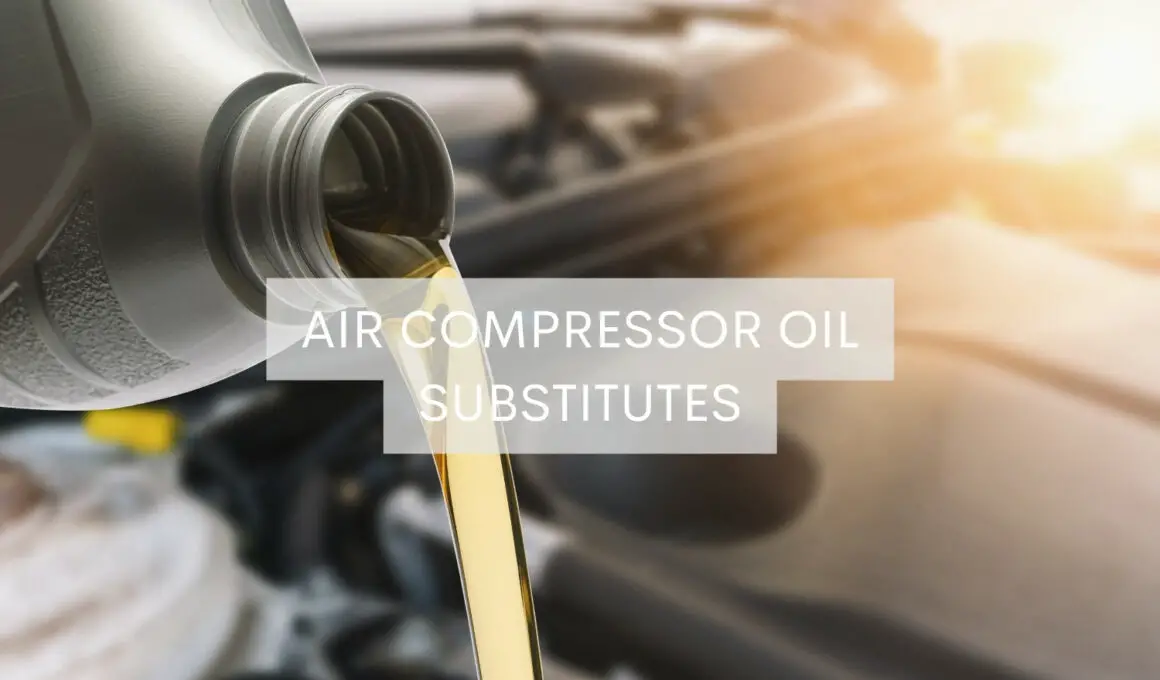In This Article Show
Air compressor oil might sound like just another component in a long list of parts, but it plays a critical role in the health and efficiency of your air compressor.
Much like how blood is vital to the human body, oil is equally crucial for the smooth functioning of an air compressor. It lubricates the compressor, minimizes friction, protects against wear and tear, and ultimately, keeps your equipment running efficiently for longer.
But what happens when you can’t access standard compressor oil, or perhaps you’re seeking a more cost-effective or environmentally friendly alternative? This is where air compressor oil substitutes come into the picture.
Through my experience in both practical mechanics and penning numerous informative articles, I’ve compiled a comprehensive guide to help you understand and navigate the world of air compressor oil substitutes.
In this blog post, you’ll discover why you might consider an oil substitute, the complete list of viable alternatives, and how to choose and use the right one for your needs.

What is Air Compressor Oil?
Air compressor oil is a special type of lubricant specifically designed for air compressors. It is typically composed of base oils and additives, forming a unique blend to enhance performance and ensure the longevity of your compressor.
The primary role of air compressor oil is to lubricate the compressor’s moving parts, thereby reducing friction and preventing wear and tear. But that’s not all.
This oil also helps in cooling the compressor by absorbing the heat produced during operation. Without this vital lubricant, the compressor’s internal components could overheat, leading to decreased efficiency and, eventually, component failure.
This lubricant is also responsible for sealing the internal components of the compressor. By filling gaps in the compressor’s parts, it ensures an airtight seal, preventing air leaks and thereby maintaining pressure within the system. This is crucial for the effective operation of the compressor.
Whether your air compressor is piston-type or rotary screw, oil plays an essential role in its operation. Hence, choosing the right oil or its substitute is of paramount importance.
The Complete List of Air Compressor Oil Substitutes
While air compressor oil is specifically designed to cater to the needs of these machines, there are instances when a suitable substitute is necessary or desirable. Here, I have compiled a comprehensive list of viable air compressor oil substitutes, categorized for your convenience:
Synthetic Oil Substitutes
Synthetic oils are often considered the top alternatives due to their high performance and longevity. They typically resist breakdown and oxidation better than their non-synthetic counterparts.
1. Synthetic Compressor Oils
These non-petroleum-based oils are engineered to perform exceptionally well in various conditions. They are highly resistant to heat and oxidation, reducing sludge and deposits. Some popular synthetic oil types include PAO (Polyalphaolefin), PAG (Polyalkylene Glycol), and Diester oils.
Synthetic Motor Oils
Certain synthetic motor oils can be substitutes, especially for high temperatures and long service life. They often contain similar additives to compressor oils, such as anti-wear and anti-foaming agents.
Non-Synthetic Oil Substitutes
These are more traditional oils, often petroleum-based, that can be used as alternatives. They may not have the same level of performance or longevity as synthetic oils but are typically more readily available and cost-effective.
Standard Motor Oils
High-quality motor oil, such as 10W30 or 5W30, can serve as a potential substitute. These oils are widely available and can effectively lubricate the compressor’s components, though they may not perform as well under high heat conditions.
Hydraulic Oils
These oils resist heat, wear, and oxidation, making them suitable substitutes for compressor oil. They typically possess excellent anti-wear properties but may lack some specific additives in compressor oil.
Vegetable-Based Oils
Certain vegetable-based oils could be considered if you’re seeking an environmentally friendly alternative. However, these should only be used under specific circumstances as they may not perform well under high heat or pressure.
Canola Oil
This is a readily available and biodegradable option. However, it should only be used for low-performance compressors, as it can break down under high temperatures or pressures.
Remember, it’s crucial to thoroughly research and consider your compressor’s specifications before opting for an oil substitute.
How to Choose the Right Air Compressor Oil Substitute?
Selecting the right oil substitute for your air compressor is not a decision to be taken lightly. There are several factors to consider to ensure you choose a substitute that will maintain the performance and longevity of your equipment. Here are some key considerations:
Compressor Type
The type of air compressor you have is a critical factor. For example, rotary screw and reciprocating (piston-type) compressors have different lubrication requirements. Some oil substitutes may work well for one compressor type but not another.
Operating Conditions
The environment in which your compressor operates can impact the type of oil substitute you need. If your compressor regularly operates under high heat or intense pressure, you’ll need a substitute that can withstand these conditions, such as synthetic oils. For less demanding situations, a non-synthetic oil may suffice.
Manufacturer’s Recommendations
Always check your compressor’s manual or consult with the manufacturer before choosing an oil substitute. They often provide specific oil recommendations or guidelines that should be adhered to.
Cost and Accessibility
While you may want the best oil substitute available, practical factors like cost and availability will come into play. Consider how easily you can access the substitute and whether it fits within your budget.
Environmental Impact
If you’re conscious about the environmental footprint of your operations, consider a biodegradable oil substitute, such as certain vegetable-based oils. However, bear in mind that these oils may not perform as well under high stress conditions.
The goal is to find a substitute that will perform similarly to air compressor oil, ensuring your equipment’s effective and efficient operation.
How to Use an Air Compressor Oil Substitute
Using an air compressor oil substitute isn’t vastly different from using standard compressor oil, but there are some important steps to follow:
Select Your Oil Substitute
Based on the factors we discussed earlier, choose the oil substitute that best suits your air compressor and its operating conditions.
Drain the Old Oil
Before introducing the new oil, you need to drain the existing oil from your compressor. To do this, locate the drain valve, usually found at the bottom of the oil reservoir. Ensure the compressor is off and cool before proceeding. Open the valve and let the old oil flow into a container. Close the valve when fully drained.
Fill With the Oil Substitute
Once the old oil is drained, you can begin to fill the compressor with your chosen oil substitute. Locate the fill hole, typically marked with an oil can symbol or the word ‘oil’. Pour your substitute slowly, avoiding overfilling. Most compressors will have a sight glass or dipstick to help gauge the correct oil level.
Check for Leaks
After you’ve filled the compressor, please turn it on and let it run for a few minutes. Monitor for any oil leaks or irregularities in operation. If you notice anything unusual, turn off the compressor and consult with a professional.
Regular Maintenance
Just like with standard oil, it’s essential to maintain a regular maintenance schedule with your oil substitute. Regularly check the oil level and quality, topping up or changing as necessary.
Remember, although you’re using a substitute, treating it as you would regular compressor oil is important. This means maintaining regular checks and changes to ensure the ongoing health of your compressor.
The Impact of Using an Oil Substitute on Your Air Compressor
Just as with any change in equipment operation, using an oil substitute for your air compressor can have various impacts. Understanding these can help you make an informed decision and ensure you take any necessary precautions.
Potential for Increased Wear and Tear
While many oil substitutes are designed to perform similarly to compressor oil, not all will offer the same level of protection. Depending on your chosen substitute, you may see increased wear and tear on your compressor’s internal components over time.
Variable Performance
Some substitutes may alter the performance of your compressor. For instance, synthetic oils often perform better under high heat and pressure conditions than non-synthetic oils. On the other hand, vegetable-based oils may not hold up as well in demanding situations.
Alteration in Maintenance Schedule
Different oils degrade at different rates. Therefore, the frequency of oil changes may vary when using a substitute, which could impact your maintenance schedule.
Cost Implications
Depending on the substitute, there could be cost implications. While some substitutes might be cheaper upfront, the long-term costs could be higher if they lead to increased wear and tear.
Environmental Impact
Some substitutes, particularly vegetable-based oils, have a lower environmental impact compared to standard compressor oil. This could be a positive impact if reducing your operations’ environmental footprint is a priority.
It’s essential to understand that each air compressor is unique, and the impact of using an oil substitute will vary. Regular monitoring and maintenance are key to ensuring that your compressor continues to operate effectively.
Consult with a professional if you’re unsure about choosing or using an oil substitute.
Frequently Asked Questions
Can I use motor oil as a substitute for air compressor oil?
Yes, in certain circumstances, high-quality motor oil can be used as a substitute for air compressor oil. However, this should only be considered if the manufacturer’s guidelines permit and your compressor’s operating conditions are considered.
Are synthetic oils better than non-synthetic for my air compressor?
Synthetic oils are generally considered superior due to their high performance and longevity under various conditions. However, they are also typically more expensive than non-synthetic oils. The choice between the two will depend on your compressor’s needs, budget, and manufacturer’s recommendations.
Can vegetable-based oils be used in my air compressor?
Certain vegetable-based oils, such as canola oil, can be used as an environmentally friendly alternative. However, these oils often don’t perform as well under high heat or pressure conditions and should only be used for low-performance compressors.
What happens if I use the wrong oil substitute in my air compressor?
Using the wrong oil substitute can lead to increased wear and tear, decreased compressor performance, and potential component failure. Always consult your compressor’s manual or the manufacturer before choosing a substitute.
How often should I change the oil substitute in my air compressor?
The frequency of oil changes can vary depending on the substitute used. Generally, you should check the oil level and quality regularly, changing it as necessary. For a specific timeline, refer to your compressor’s manual or consult the manufacturer.
Wrapping it up
Air compressors, being their vital tools, require special attention when it comes to their maintenance. The type of oil you use in your air compressor can significantly impact its performance, lifespan, and overall health. While standard air compressor oil is typically recommended, there are various reasons why you might opt for a substitute.
We’ve explored the different substitutes, from synthetic and non-synthetic options to more environmentally friendly choices like vegetable-based oils.
While the range of alternatives can seem daunting, by considering factors such as your compressor type, operating conditions, and the manufacturer’s recommendations, you can select the right substitute for your specific needs.
However, it’s crucial to remember that any substitute should be treated with the same level of care as standard compressor oil. Regular checks, timely oil changes, and close monitoring of your compressor’s performance are key to maintaining its health, irrespective of the oil type used.






















